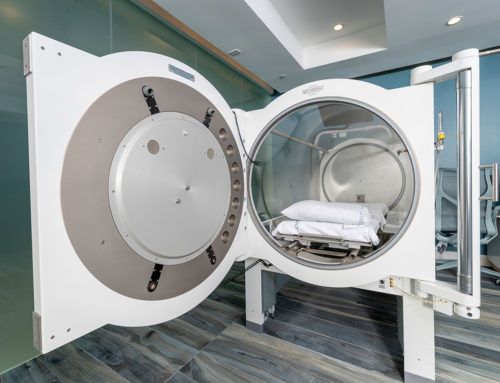Hyperbaric Oxygen Therapy (HBOT) has recently emerged as a potential therapeutic approach for treating mood disorders like depression and anxiety. HBOT is administered by introducing pure oxygen into a pressurized environment, increasing the oxygen levels in the body, and promoting healing. It is commonly known for treating conditions like decompression sickness and anemia. Recent studies have suggested that HBOT may also have a positive impact on mental health disorders such as anxiety.
Anxiety & Traditional Treatment
Anxiety disorders are a prevalent and debilitating condition affecting many individuals worldwide. Anxiety conditions are characterized by excessive fear or worry about situations, known or unknown. Those suffering from anxiety may find it challenging to identify the source of their concern. Traditional treatments for anxiety often include therapy, medication, or a combination of both. Therapy emphasizes developing coping skills and strategies to navigate anxiety symptoms and triggers. Medication treatments work by attempting to balance the various chemicals and hormones associated with anxiety and other mood disorders. These approaches are widely accepted but may not be effective for everyone. Some individuals may experience unwanted side effects from medication or find it challenging to manage their symptoms. In such cases, alternative treatment options like HBOT can offer promising alternatives.
Hyperbaric Oxygen Therapy & Anxiety
One of the ways hyperbaric oxygen therapy may help reduce anxiety is by increasing the oxygen available to the brain. Anxiety has been associated with reduced blood flow and impaired oxygen delivery to certain areas of the brain. Pure oxygen supplied during HBOT helps the body oxygenate tissues, enhancing blood flow and providing the brain with more oxygen. Among the immediate effects is reduced pressure on the brain as blood circulates more freely.
The increased oxygen supply from HBOT also stimulates the production of growth factors, promoting the formation of new blood vessels. This ideally leads to improved brain function and enhanced neuroplasticity, which is the brain’s ability to adapt and change. If successful, this may help with longer-term anxiety relief and an increase in overall cognitive health.
Inflammation Reduction
HBOT has also been found to reduce inflammation in the body, including the brain. This gives HBOT the potential to treat a variety of conditions, including anxiety disorders. Inflammation in the brain has been linked to the development and progression of several mental health conditions, especially anxiety disorders. By reducing inflammation, HBOT may help alleviate anxiety symptoms and improve patients’ overall mental well-being.
Neurotransmitter Rebalancing
Treatment with HBOT can also potentially provide a calming effect on the nervous system to counter anxiety symptoms. The increased oxygen levels in the body can induce a relaxation response by altering the balance of neurotransmitters, such as serotonin and gamma-aminobutyric acid, which play a key role in regulating mood. This regulation is significantly impacted by mental heath disorders like depression and anxiety. HBOT may enhance the release of these neurotransmitters and facilitate their binding to their respective receptors, reducing anxiety symptoms.
Several studies have provided evidence of the potential benefits of HBOT for anxiety reduction, and research is ongoing. In a study conducted in 2022, it appeared that HBOT recipients experienced significant anxiety relief compared to non-recipients. The study was based on patients who exhibited various post-COVID physiological conditions. Beause there is a variety of potential causes for anxiety, treatment outcomes can’t be guaranteed for all patients experiencing anxiety.
The Future of HBOT
Many medical institutions consider HBOT a safe and effective therapy, but its full potential continues to be investigated. Side effects of HBOT treatment are fairly easily mitigated, often simply by carefully equalizing pressure during the treatment session. Individuals with certain medical conditions, such as respiratory infections, lung diseases, or untreated high fevers, may not be suitable candidates for HBOT.
Because the medical science community is still investigating HBOT’s long-term effects, it should not be used to replace conventional treatments for anxiety. Instead, it is best used as a complementary or alternative therapeutic approach that can be utilized alongside other treatment approaches. The effectiveness of HBOT may vary from person to person, making it helpful to consult with a healthcare professional who is knowledgeable about HBOT and anxiety disorders to determine the suitability and potential benefits of this therapy for individual cases.
Schedule an HBOT Session for Your Anxiety
The current understanding of HBOT suggests a strong potential as a therapeutic option for reducing anxiety. Using HBOT to increase oxygen levels in the body, reduce inflammation, and modulate neurotransmitter activity can have a positive impact on anxiety symptoms and other injuries and mental health disorders. Research continues to add to our understanding of the optimal dosage, treatment duration, and long-term effects of HBOT on anxiety. If you want to learn more about HBOT as a potential anxiety treatment, contact Aalto Hyperbaric to speak with a professional. Schedule an appointment today if you have received medical clearance from your doctor to participate in HBOT.
RELATED POSTS
GET STARTED TODAY
Schedule an appointment with us today by calling (310) 507-7942 or using the contact form below.discover thisread what he saidelfbar 3500company website


